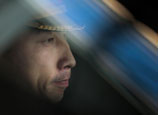
He said the real crunch will come after 2015, making now the optimal time for foreign businesses to enter the market.
"The timing at present is ripe for foreign investors to enter the market and build their brand."
Already, families are recognizing the pressure put on children and the need to adapt to China's transforming family structure.
"With the rapid growth of China, many have changed their train of thought. People are starting to live individually, paying for their own care," said Ma Zhang, 83, a retired government official who has been using US-based Right-At-Home Care, an in-home nursing service, for more than a year.
Speaking in a lavishly decorated two-story apartment in Beijing's Fengtai district where he lives with his 81-year-old wife, the energetic octogenarians said they began using the service to help alleviate the pressure on their two children.
With their daughter working as an auditor in the United States and their son working for a large telecommunication company in the capital, he said it is difficult for their children to find time to visit.
"My children are very busy, so it gets quite lonely every day," Ma said.
The caretaker not only monitors their health and helps with housework, but converses with the elderly couple throughout the week. That seemingly mundane but necessary task was one of the driving factors for Ma and his wife.
At 20,400 yuan a month, paying for conversation may seem extravagant, but paying for foreign senior care is also a sign of status, akin to owning a nice car.
"We chose this brand because it is American and we knew it would be high quality. Many of our friends admire our ability to afford this kind of service."
This positive perception of foreign brands is giving companies like Right-At-Home and Cascade a leg up when angling for middle-class families who can afford to pay for quality senior care.
Another cultural barrier for foreign companies breaking into the market is the perception that senior assisted living can be a sign of luxury. In many cities across China, many of the current senior health facilities are funded by government and geared toward low-income families.
"In the past 10 to 20 years almost all of the senior facilities were created by the government and geared toward people on low incomes. Because of this (assisted living) has a very bad reputation," Xie of Cascade Healthcare said.
She said if senior care companies want to see the industry grow, they must convince the younger generation that putting their parents in assisted living is not necessarily a bad thing.
"I think for us, making money is one thing, but more important it's that we want to make a difference here. We want to show people what it's like for seniors in developed countries to live," Xie said.
In addition to tackling perception, there is also the reality of numbers.
Ninety percent of seniors will either remain "aging-in-place", or living on their own or with their children, while 7 percent will live in community or government housing geared for those on a low income. Three percent are in high-end private housing centers.
















 Nutritious lunch provided in Taipei's elementary school
Nutritious lunch provided in Taipei's elementary school


![]()
